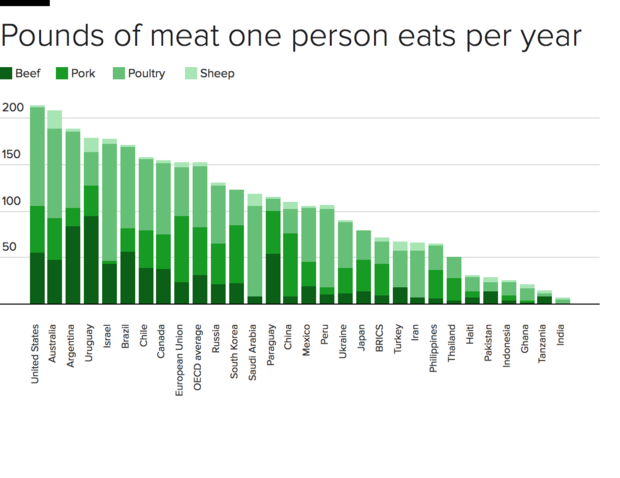Is it time to put a tax on meat?
First they came for cigarettes, then soda. Will those favoring taxes as a remedy for health problems now come for our barbecue?
Slapping taxes on processed meat and red meat could prevent 222,000 deaths and save $41 billion in global health costs every year, according to a new study.
The figures are based on studies that have linked red meat consumption to cancer, diabetes and stroke. In the U.S., the proposed tax would be set at 163 percent on processed meat such as sausages or bacon, and 34 percent on red meat, like steak or ground beef.
"In the U.S.A., tax levels are much higher because the health system is one of the least efficient in the word," said Marco Springmann, the study's lead author. It's not the highest, though: Germany, Austria, Norway and Sweden all would see a slightly higher meat tax under this system, the study showed.
Springmann said the idea for the study came several years ago, when the World Health Organization declared certain types of meat were carcinogenic. "If it's a carcinogen, surely it ought to be regulated in some way, because governments have a responsibility to protect their citizens from carcinogens," he said.
The taxation system would save an estimated 53,000 lives in the U.S., according to the study.
Not everyone agrees. The North American Meat Institute took issue with the study, pointing out that it did not take into account meat's nutritional benefits—among other criticisms.
"There are many other public health recommendations and alterations to people's lifestyle that would reduce the burden of chronic disease like maintaining a healthy weight, living an active lifestyle, and not smoking to name a few. The 95% of Americans and billions of others around the world who eat meat and enjoy the many nutritional benefits it provides should never have to be punished with a tax on a delicious food that nourishes them," KatieRose McCullough, the group's director of scientific and regulatory affairs, said in a statement.
But it's not the first time a "meat tax" has been proposed: PETA came out with the idea several years ago. FAIRR, an investment group that does research around "risks and opportunities caused by intensive livestock production" has also suggested the idea. Denmark briefly had a tax on saturated fats, which acted much like a "meat tax," before repealing it in 2012.
Meat may be a long shot, but more and more municipalities are taxing other dubious items like sugar-sweetened drinks. (Recreational drugs like liquor, tobacco and marijuana are taxed even more heavily.)
Taxing meat "makes a tremendous amount of sense," said Michael Martin, a physician and professor in the Department of Epidemiology and Biostatistics at the University of California, San Francisco.
When sugar-sweetened drinks are taxed, he noted, population health improves because people consume less of them.
He added, "People have to get used to this idea that red meat is not good for us."




